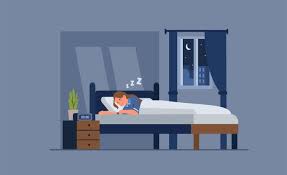Sleep is a fundamental aspect of our lives that affects our physical, mental, and emotional well-being. It is essential for our bodies to rest and recover from the day’s activities, allowing us to recharge and wake up feeling refreshed and energized. However, not everyone gets enough sleep or quality sleep, which can have negative consequences on our health.
According to the Centers for Disease Control and Prevention (CDC), one in three adults in the United States does not get enough sleep. This lack of sleep can lead to a range of health problems, including obesity, diabetes, cardiovascular disease, depression, anxiety, and impaired cognitive function.
The amount of sleep we need varies depending on age and individual needs. Generally speaking, adults need between seven to nine hours of sleep per night. Children and teenagers require more sleep than adults due to their growth and development needs.
There are many factors that can affect the quality of our sleep. Stressful events such as work deadlines or personal problems can keep us awake at night. Poor sleeping habits such as drinking caffeine before bedtime or using electronic devices in bed can also disrupt our sleep patterns.
Fortunately, there are several strategies we can use to improve the quality of our sleep. Establishing a regular bedtime routine can help signal to our bodies that it’s time for rest. This routine could include activities such as taking a warm bath or reading a book before bed.
Creating a comfortable sleeping environment is also important for getting quality sleep. This includes having a comfortable mattress and pillows as well as minimizing noise and light in the bedroom.
Avoiding certain substances before bedtime can also help improve the quality of our sleep. For example, alcohol may make us feel drowsy initially but it can disrupt our sleep later in the night.
In addition to these strategies, incorporating relaxation techniques such as meditation or deep breathing exercises into your daily routine can help reduce stress levels and promote better quality sleep.
In conclusion, getting enough high-quality sleep is essential for our overall health and well-being. By adopting healthy sleep habits and making sleep a priority, we can improve our physical, mental, and emotional health.
Answers to Common Questions About Sleep: Duration, Tips, and the 10-3-2-1-0 Rule
- How much sleep do you need by age?
- What is the 10 3 2 1 0 sleep rule?
- Is 7hrs of sleep enough?
- What helps to fall asleep?
How much sleep do you need by age?
The amount of sleep needed varies depending on age. Here’s a general guideline for how much sleep is recommended by age group:
– Newborns (0-3 months): 14-17 hours
– Infants (4-11 months): 12-15 hours
– Toddlers (1-2 years): 11-14 hours
– Preschoolers (3-5 years): 10-13 hours
– School-age children (6-13 years): 9-11 hours
– Teenagers (14-17 years): 8-10 hours
– Young adults (18-25 years): 7-9 hours
– Adults (26–64 years): 7–9 hours
– Older adults (65+ years): 7–8 hours
It’s important to note that these are general guidelines and individual needs may vary. Some people may require more or less sleep than what is recommended based on their lifestyle, health, and other factors. It’s also important to prioritize quality of sleep in addition to quantity, as poor quality sleep can still lead to negative health outcomes even if you’re sleeping for the recommended amount of time.
What is the 10 3 2 1 0 sleep rule?
The 10-3-2-1-0 sleep rule is a set of guidelines that can help individuals establish healthy sleep habits and improve the quality of their sleep. The rule is as follows:
– 10 hours before bed: No caffeine or alcohol consumption
– 3 hours before bed: No more food or drink
– 2 hours before bed: No more work-related activities or screen time
– 1 hour before bed: Relax with a calming activity such as reading or taking a warm bath
– 0: Turn off all electronic devices and go to sleep
By following this rule, individuals can create a consistent bedtime routine that helps them wind down and prepare for restful sleep. Avoiding caffeine and alcohol in the evening can reduce the likelihood of waking up during the night, while avoiding food and drink closer to bedtime can prevent discomfort and indigestion.
Turning off electronic devices at least an hour before bed can help calm the mind and reduce exposure to blue light, which can interfere with our natural circadian rhythm. Engaging in relaxing activities such as reading or taking a bath can help reduce stress levels and promote relaxation.
Overall, the 10-3-2-1-0 sleep rule is a helpful guideline for establishing healthy sleep habits. By incorporating these habits into your daily routine, you may find that you fall asleep faster, stay asleep longer, and wake up feeling more refreshed in the morning.
Is 7hrs of sleep enough?
The amount of sleep needed varies from person to person and depends on various factors such as age, lifestyle, and overall health. While the general recommendation for adults is between 7 to 9 hours of sleep per night, some individuals may require more or less sleep than others.
Research suggests that consistently getting less than 7 hours of sleep per night can have negative consequences on our health, including an increased risk of obesity, diabetes, cardiovascular disease, and mental health issues such as anxiety and depression. However, it’s important to note that some people may function well with less than 7 hours of sleep per night.
Ultimately, the best way to determine if 7 hours of sleep is enough for you is to pay attention to how you feel during the day. If you feel alert and refreshed throughout the day without feeling excessively tired or sleepy, then 7 hours of sleep may be sufficient for you. However, if you consistently feel fatigued or drowsy during the day despite getting 7 hours of sleep per night, then you may need more sleep to function optimally.
What helps to fall asleep?
There are several things you can do to help fall asleep more easily:
- Stick to a regular sleep schedule: Try to go to bed and wake up at the same time every day, even on weekends.
- Create a relaxing bedtime routine: This could include taking a warm bath or shower, reading a book, or listening to calming music.
- Make your bedroom comfortable: Ensure that your bedroom is dark, quiet, and cool. Use comfortable pillows and blankets.
- Avoid electronics before bedtime: The blue light from electronic devices can interfere with your body’s production of melatonin, the hormone that regulates sleep.
- Limit caffeine and alcohol intake: Caffeine is a stimulant that can keep you awake while alcohol may make you feel drowsy initially but disrupts sleep later in the night.
- Exercise regularly: Regular exercise can help improve the quality of your sleep but avoid exercising too close to bedtime as it may make it harder to fall asleep.
- Practice relaxation techniques: Techniques such as meditation or deep breathing exercises can help reduce stress levels and promote better quality sleep.
- Consider natural supplements: Certain supplements such as melatonin or valerian root may help promote relaxation and improve sleep quality. However, it’s important to speak with your healthcare provider before taking any new supplements.
Remember that everyone’s sleep needs are different, so it’s important to find what works best for you when it comes to falling asleep more easily.




